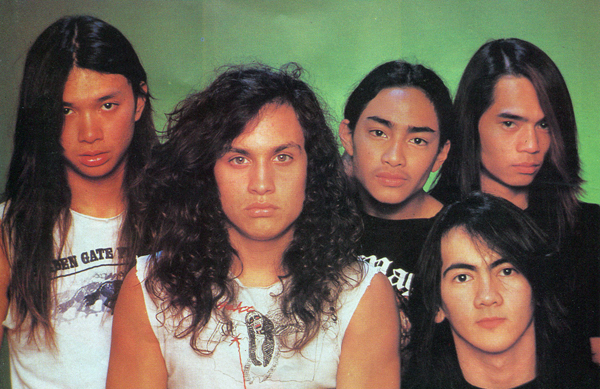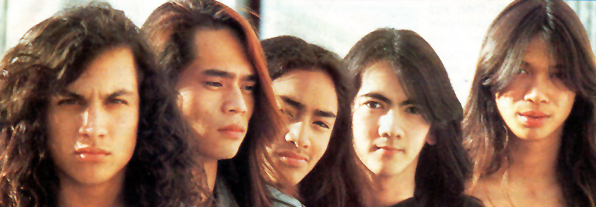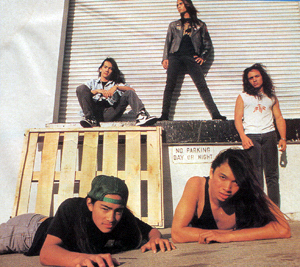
|
Search JoyZine with Google Site Search! |
Death Angel Interview by Daina Darzin
published in Thrash Metal (U.S.)
A couple of years ago, Enigma Records publicists were guiding Death Angel around the New Music Seminar, buying press people drinks and doing the meet 'n' greet. Everyone thought the band was cute. Like, oh god, they're so young, so full of oh-wow-we're-in-the-music-business na�vet�. It was an impression of themselves the band didn't share, even then. Two albums later, a lot of folks are citing them as speed metal's heaviest young hope, while others still regard them as thrash's answer to Menudo. While their fans have been moshing out on their undeniable power and full-throttle chops, the press have focused mainly on the fact that they're teenagers, and Philippino cousins. But they're already veterans who've just released their third album, the aptly titled Act III, on new label Geffen, for Chrissake. And they're good and sick of getting treated like a novelty act. The image "was pushed so much," groans lead singer Mark Osegueda. "I can see the point where the press might use that to catch people's attention, but after a while it seemed like that's what was said first, and they talked about it almost all the way through [an article]. And then near the end they'd mention, 'Oh, yeah, they play music too.' Music was totally secondary, which we don't believe at all, 'cause we're not a commodity band in any way. But the third time's the charm, it seems, in losing all the unwelcome baggage. "People take our music more seriously now," Mark insists. "On this record, our sound is more defined, but on the second album it was more choppy. This one is a lot more smooth. It breaks in and defines our style a lot more." True. Death Angel's earlier offerings (The Ultra-Violence and Frolic Through the Park, both on Enigma) relied on speed and energy, and made up in (sorry guys) youthful gung-ho spirit what it lacked in melodic development. Not so of Act III. It's complex tunes feature a funk edge without taking away one iota of the band's metal punch. Kill-em-all cuts coexist with several acoustic (!!) numbers. "We had a lot more time to be working on the album," Mark explains. "We had over a month to record, whereas on the last two albums... one was three days, one was seven. But mainly it was pre-production, which we had for the first time. Death Angel worked with famed producer Max Norman (Ozzy, etc) this time around, and unanimously rave about the experience. "He got to know each and every one of us, and he knew how to bring out the best in us," Osegueda recalls. For their first two albums, Death Angel more or less co-produced with a Bay Area friend of theirs because "we were afraid to work with a producer 'cause we thought he'd come in and say, 'No, you do this and you do this,' and try to change us. But with him, it was like having a friend there. He just let us flow."
The album was recorded in L.A., about which Death Angel do not unanimously rave. "Before we went out there, I used to think L.A. was fun for about five days," says Mark. "Now I think it's fun for a weekend. We were down there for a month and a half. By the time I left, I never wanted to see the place again. A lot of people you meet are really fake—it really got on my nerves. It's a really weird scene there. L.A.'s a lot more image heavy, whether your image is flashy and hot-looking or anti-image—that biker look. It's all image—you go up to a club and you see a line of Harleys, whereas in San Francisco everything's a lot more relaxed. You can just go to shows in your sweats and be totally you, and no one really cares. L.A., people go out to drink and pick up on each other. In San Francisco they actually go to see the show. But then, we just went back to L.A. to do our video and we had a great time!" When Death Angel began in 1983 they were far, far away from video shoots, in any city. They were, well, in junior high for the most part. Lead guitarist and primary songwriter Rob Cavestany and rhythm guitarist Gus Pepa started out with an acoustic guitar and some pots and pans for drummer Andy Galeon, then age nine. Back then, Dennis Pepa served as both bassist and singer. Mark Osegueda was recruited soon thereafter. Their parents were cool about helping them out with cash to buy instruments and providing a garage to rehearse in. And then, suddenly they were like a real band, despite that notorious youth. They had people coming to their gigs—mostly in underground clubs that were willing to overlook the fact that they were underage. They made two demos, Heavy Metal Insanity and Kill As One. The latter was produced by Metallica's Kirk Hammett and became an underground fave in the Bay Area. And then there were opening gigs with Metallica, Mercyful Fate, Slayer and Exodus. A manager. A label, and not just one of those do-it-yourself local jobs, Enigma. By this time the two oldest Angels, the Pepas, were 19. A year later they were playing European festival dates for 50,0000+ crowds. And then everything almost fell apart. Death Angel changed managers and, although they're still not talking about it—"I'm still on the 'No comment' thing," Mark laughs—but industry rumor has it that they signed a contract with Geffen while they were still signed to Enigma, a legal no-no that resulted in much unpleasantness. "We really had a rough year and a half," admits Mark, "but we're out of it now. What I learned from it is, don't sign everything you see. Your signature can be more expensive than you thought," he laughs and adds, "You hope, when you're first starting out, that this business is made up of music lovers. But it's a business like anything else. That's how it is."
It's hard not to come back to their age, I tell Mark. This revelation about the realities of the biz usually hasn't hit most 21-year-olds. "We learned a lot while we were still younger," he agrees. "We're still growing, and that's what's cool, because our music grows with us, too. But it's hard with friends who aren't involved with the band—their lives go on, and when you go away and come back you've missed so much. It's weird. The number of [non-music-business] friends tends to get smaller. "You can't help growing away from people." The absence of "normal" teenager-type activities affected Andy Galeon the most. "See, I got to graduate," says Mark. "I made it all the way through high school. As soon as I graduated, we started leaving on tour. Andy tried to go to school through correspondence, but he had to take the [G.E.D.] test 'cause we were away so much. But then, he learned so much from being on the road." Touring "makes you more aware of America. You learn stuff you'd never learn [otherwise] about different cultures, beside the architecture and beauty over there. Things like, in Europe, they take education so much more seriously than anyone in America does. It's so much more important to them, knowledge. The kids get so involved in politics, they know everything at such a young age, it's weird." The fact that America is not that way, Mark thinks, is a fault of society more than kids. "Education is not pushed on them," he says. "Anyone who wants to learn has to take it upon themselves. In Europe, when we go there, right away they ask us about politics. We don't know that much about it. I watch the news now but before, I didn't, and I was blown away that people were so interested in it. That's also why the really good, big political bands with substance come from Europe." Death Angel themselves aren't directly political—they're more, well, thoughtful. Mysterious. Dealing with larger concepts—aging, power, the use of senses, betrayal, struggles. Themes that wind in and out of the material on Act III, spiking their basic, heavy sound. Themes that are more serious than the guys who make music out of them, "We're always loud," Mark admits. "You can't really expect to take us somewhere nice and expect us to behave. There's always someone yelling and throwing something. When all five of us get together it's never a quiet thing." Separately, "Gus is very silent; he keeps to himself," says Mark, describing his bandmates. "Rob is really hard-headed when it comes to stuff he believes in, but he's also the kindest. Andy and Rob are the two most intelligent, but Andy's really moody. Dennis is kind of the loud, obnoxious one. I'm loud, but Dennis is the shit-starter, the untactfully loud one." When not on tour Mark stays home, practicing his vocals. He also runs and works out. "Andy works out a lot also, and we go to shows a lot. Rob and Dennis, they love to fish. They do it whenever they can. I hate fishing. Me and Andy refuse to go—they always ask us in a joking way. It doesn't get me jumping." "If I have time, I'll go on vacation," Mark adds—Paris is his favorite. One would think he'd get the traveling out of his system by touring, but too much of the time it's hotel-venue-bus, hotel-venue-bus. "Last tour, we had some days off in different places, so we made our rounds [of sightseeing]," Mark explains. "But this [upcoming European] tour's going to be really hectic—28 dates in 32 days. We won't have that much time to see anything." After that, tentative plans call for a trek through Japan and then a long, long tour of the States. It's the schedule of a band that's looking to live up their Next Big Thrash Band tag. "If I were to tell you we didn't care if we made it [commercially], that would be a lie," Marks says, "because we do." But "the stuff on top of the charts is so repetitive and simple and forced down [fans'] throats so much that they tend to like it. And whenever something hits and it's catching on, right away there's a bunch of people who have to jump on other people's tailcoats and go along for the ride. It's like, just go to L.A. and see how many Guns N' Roses-type of bands there are out there now. "I wouldn't mind being successful," he continues, "'cause I want our music to reach as many people as possible. But we're not going to write music in order to be successful, but try to be successful writing the way we do, just sticking to our own guns." |


